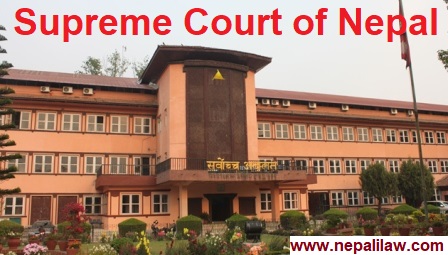The Supreme Court set principle that the killing of a child born (infanticide) in such a conditions when the woman concerned has unprotected/unsafe sex should not be punished as in other murder cases.
A joint bench of Supreme Court combined of Justices Ishwar Prasad Khatiwada and Hari Prasad Phuyal commuted the life sentence of a teenage girl, where the district court sentenced for life imprisonment.
The Supreme Court has recently made public the full text of the decision made on March 22, 2008. The Supreme Court has ruled that infanticide’s in ‘compulsive Condition’ should not be treated like any other murder.
The Case, is in 2075 BS, a 16/18-year-old girl from Parbat District was made pregnant by a local Man Bahadur Malla. After becoming pregnant, the girl reported the matter to the man concerned. She had asked him to marry her. But Malla was denied to marriage and, said that suggested to kill the unborn child as soon as it was born.
The girl hid her pregnancy for nine months out of fear of home, family and society. She killed the baby and threw it away.
Both girl and alleged Man bahadur Malla was charged with murder. The Parbat District Court had sentenced the girl to 16 years and 8 months in prison after she confessed to killing the baby. and Boy also sentenced for 5 years of imprisonment. The High Court then reduced the sentence to five years. In the end, the Supreme Court sentenced him to two years in prison.
Supreme Court stated that ‘After the teenager became pregnant, the man concerned did not seem ready to accept the child. Therefore, due consideration as the child born out of unprotected/unsafe sex has become pregnant and the child born to avoid social stigma has to be considered.”
Court emphasized that it seems appropriate to make a decision considering the circumstances and circumstances of killing a child born to avoid pregnancy and social stigma after having unprotected/unsafe sex. As the defendant is mentally immature and has the condition of a minor, it seems that the ability to make appropriate decisions has not been developed. She seems to be hiding from the time of conception due to the rejection, public shame and possible hatred of family, friends, neighbors and society.
SC further elaborated that from a judicial point of view, it seems appropriate to reduce the punishment for such offenses considering the age of the woman concerned, social status or the condition of the people.
Court said that that in order to avoid social stigma and public shame, the mother who gave birth to the child without thinking about the consequences of the criminal act killed the child and helped the judicial process by admitting guilt from the very beginning. Even considering the situation, even if a minimum punishment is given for a crime of this nature, the purpose of justice seems to be fulfilled.
The Supreme Court decided that the punishment given by the district court will be harsher as it has helped the judicial process by admitting the guilt of killing a child without giving any thought to the consequences of criminal acts to avoid social stigma and public shame. The purpose of the law will be fulfilled if the girl is sentenced to two years imprisonment considering the situation and circumstances that will be aggravated when she is punished according to the law.
Apex Court explained that ‘Changes in the constitutional, legal and social attitudes towards women, their social status, and their involvement in such acts as the legal age for a child born to a woman of any age group due to unprotected/unsafe sex or the immediate birth of a child born to a woman under the age of 20. Women may not be cruel and criminal, but men may be irresponsible and may be compelled to do so out of public shame, hiding, abandoning and killing children at birth. From a humanitarian point of view, if there are women in the younger age group, their developmental status should be taken into consideration.
The high court had reduced the sentence of the district court to five years imprisonment. Among the defendants, Malla was sentenced to six years imprisonment by the district court.
For full-text of Verdict
You can see 076-RC-0168 of Supreme Court
 Nepali Law A complete legal information portal
Nepali Law A complete legal information portal

